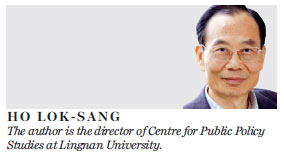Young people need to improve their attitudes
Updated: 2015-05-13 08:08
By Ho Lok-Sang(China Daily)
|
|||||||
It has been noted that many young people support the "Occupy Central" campaign and they are much more likely to oppose the constitutional reform package proposed by the SAR government. It has also been noted that young people were less likely to call themselves Chinese nationals than other age groups. Recently, the Student Union of the Chinese University of Hong Kong (CUHK) protested to the university for allowing the People's Liberation Army Hong Kong Garrison to visit the campus and met students. Many young people in Hong Kong also seem to lack an understanding of what civility and respect for other people really means.
I hate stereotyping. Clearly there are different types of young people; making gross generalizations is unfair and counter-productive. But many young people in leadership roles, particularly presidents of student unions, the Hong Kong Federation of Students (HKFS), and the Scholarism, seem to lack the right attitudes to be mature, effective leaders.
An important question to ask is: What would you do if reality deviates from your ideals? A mature leader will consider his options. He or she will choose the option that brings about results closest to his ideals. A mature leader has sound priorities and will never be bound by dogma.
Consider, for example, the "student referendums" over whether or not to stay within the HKFS. So far the student unions of the University of Hong Kong, Hong Kong Baptist University, Hong Kong Polytechnic University, and the CUHK have dropped out of the HKFS. The decision was based on dissatisfaction with the HKFS. The nature of this dissatisfaction need not concern us here. But instead of working from within to improve governance of the student body, several student unions chose to drop out.
Consider the events that led to the launch of "Occupy" last year. The HKFS and Scholarism were advocating "public nomination". They were disappointed because the Basic Law does not allow this. The students did not accept that the Basic Law has long been passed into law. Beijing had agreed to grant universal suffrage because the existence of the Nominating Committee was regarded as a safeguard against the possibility of installing a CE who will not accept Beijing's rule over Hong Kong. After legislation is passed, no one can uphold what they like about it and then reject what they don't like. If anyone wishes to make alterations, they have to follow legislative changes. This means one has to work within the system. For every establishment or system, there is usually something about it that people may find disagreeable. Does this mean then that one should become anti-establishment?
Unfortunately, there has been an emergence of this anti-establishment mentality. If a few police officers had broken rules, some of our young people condemn the police as "a dark force" or a "rogue police force". They use the worst language to insult the police and those close to them. Are people then free to use such language to insult them? Can they name a police force in the world which is perfect, where no one ever breaks rules, and is always effective in protecting people?
While young people with these immature attitudes are certainly not the majority, they are very vocal. Moreover, they do not tolerate other people with different views. They often pressure people with opposing viewpoints. While they claim they uphold freedom of speech, they really only uphold their own freedom of speech. As a result, many young people are afraid to express dissenting views.
For all these reasons, let us hope our young people will learn to be respectful, responsible, and reflective. After all, in time they will eventually run society. If society is to flourish its members need to learn to work together. Because the world is imperfect, there will always be something we need to fight for. But in a civilized society we need to fight for causes by working within the system - not by trying to overturn it. This means we need to respect the rules and other people's views. Our young people also need to learn that while they can freely express their views they must not offend other people. They need to take responsibility for wrongs they have committed. They should not try to hide their identity behind masks when committing unlawful acts. They need to reflect on their actions and think about how they can improve themselves.

(China Daily 05/13/2015 page12)